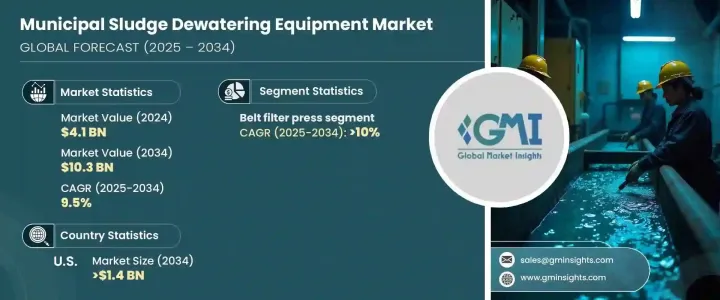
세계의 도시 슬러지 탈수 장비 시장은 2024년에 41억 달러로 평가되었고 2025년부터 2034년에 걸쳐 CAGR 9.5%의 견조한 성장이 예측되고 있습니다.
이 급성장은 지자체와 산업계가 기존의 슬러지 처리 방법에서 보다 지속 가능한 방법을 선택하게 되어 폐수 처리 업계에서 진행 중인 변화를 반영하고 있습니다. 도시화와 산업 증가는 효율적이고 환경 친화적인 처리 솔루션에 대한 수요를 높이고 있으며, 효과적인 슬러지 관리의 필요성은 전례 없이 높아지고 있습니다. 시장은 급속히 진화하고 있으며, 재활용, 자원 회수 및 환경 발자국의 최소화에 중점을 둔 관행이 받아들여지고 있습니다. 이러한 혁신은 공중 보건에 필수적일 뿐만 아니라 지구 환경의 지속가능성 목표를 달성하는 데 있어 매우 중요합니다.

기술의 진보는 슬러지 탈수 공정의 변화에 큰 역할을 하고 있으며, 슬러지 탈수 공정을 순환형 경제의 핵심 요소로 자리잡고 있습니다. 새로운 시스템은 현재 탈수 슬러지를 생산할 수 있어 폐기물의 재사용과 처분을 보다 간단하고 비용 효율적으로 수행할 수 있습니다. 이러한 기술 혁신은 바이오가스나 귀중한 영양소의 추출 등 자원회수의 기회도 만들어내어 환경과 경제의 양면에 공헌하고 있습니다. 또한 다양한 기술적 및 환경적 고려 사항을 통합하는 폐수 관리에 대한 학제 간 접근법이 산업 전반에 침투하고 있습니다. 이러한 기술 혁신의 적층이, 지자체나 산업계의 폐수 슬러지 처리 방법에 혁명을 가져오고, 폐기물을 자원으로 바꾸고 있는 것입니다.
| 시장 범위 | |
|---|---|
| 시작 연도 | 2024년 |
| 예측 연도 | 2025-2034년 |
| 시작 금액 | 41억 달러 |
| 예측 금액 | 103억 달러 |
| CAGR | 9.5% |
도시 슬러지 탈수 장비 시장은 2034년까지 100억 달러에 이를 것으로 예상됩니다. 이러한 성장은 지속가능하고 효율적인 슬러지 관리 솔루션에 대한 수요 증가가 원동력이 되고 있습니다. 슬러지량의 삭감, 탈수 성능의 향상, 귀중한 자원의 회수를 위한 대처가 신기술의 개발을 가속시키고 있습니다. 이와 병행하여 장비 설계, 자동화 및 제어 시스템의 발전으로 탈수 공정의 운영 효율성이 향상되고 비용이 절감됩니다. 세계 각국의 정부가 미처리 폐기물과 매립으로 인한 환경에 미치는 영향에 대한 규제를 강화하는 가운데, 보다 진보된 탈수 장비에 대한 요구는 그 어느 때보다 높아지고 있습니다. 이 수요를 견인하는 주요 기술 중에서도 벨트 필터 프레스는 두드러지며 2032년까지의 CAGR은 10%를 나타낼 것으로 예측되고 있습니다. 이러한 시스템은 슬러지를 효율적으로 탈수하고, 폐기 비용을 대폭 절감하며, 지속가능성 목표에 부합하는 능력으로 특히 지지됩니다.
미국의 도시 슬러지 탈수 장비 시장도 눈부신 성장을 이루고 있으며, 2034년까지 14억 달러의 성장이 전망되고 있습니다. 엄격한 환경 규제와 지속 가능한 폐수 처리의 추진이 이 시장 확대의 원동력이 되고 있습니다. 매립지에 대한 의존도를 줄이고 귀중한 자원을 회수하는 것에 초점을 맞추고 있는 것이 원심분리기나 스크류 프레스 등의 선진 기술의 채용을 뒷받침하고 있습니다. 노후화 된 폐수 처리 시설의 업그레이드에 대한 투자는 시장 기세를 더욱 가속화하고 있습니다. 지자체 부문과 산업 부문 모두 처리 공정의 현대화와 개선을 모색하고 있기 때문에 효과적인 슬러지 탈수 솔루션에 대한 수요는 앞으로도 강력한 성장을 계속할 것으로 예상됩니다.
The Global Municipal Sludge Dewatering Equipment Market was valued at USD 4.1 billion in 2024 and is projected to grow at a robust CAGR of 9.5% from 2025 to 2034. This surge reflects the ongoing shift in the wastewater treatment industry, as municipalities and industries move away from traditional sludge disposal methods in favor of more sustainable practices. The need for effective sludge management has never been more critical, as increasing urbanization and industrial growth heighten the demand for efficient, environmentally responsible treatment solutions. The market is evolving rapidly, embracing practices that focus on recycling, resource recovery, and minimizing the environmental footprint. Not only are these innovations essential for public health, but they are also pivotal in meeting global environmental sustainability goals.

Technological advancements have played a significant role in transforming the sludge dewatering process, positioning it as a core element of the circular economy. New systems are now capable of producing dewatered sludge, making it easier to reuse and dispose of waste more cost-effectively. These innovations are also creating opportunities for resource recovery, such as the extraction of biogas and valuable nutrients, which contribute to both environmental and economic benefits. Moreover, interdisciplinary approaches to wastewater management, which integrate diverse technological and environmental considerations, are gaining traction across industries. The combination of these innovations is revolutionizing the way municipalities and industries handle wastewater sludge, turning waste into a resource.
| Market Scope | |
|---|---|
| Start Year | 2024 |
| Forecast Year | 2025-2034 |
| Start Value | $4.1 Billion |
| Forecast Value | $10.3 Billion |
| CAGR | 9.5% |
The municipal sludge dewatering equipment market is expected to reach USD 10 billion by 2034. This growth is driven by increasing demand for sustainable and efficient sludge management solutions. Efforts to reduce sludge volumes, enhance dewatering performance, and recover valuable resources are accelerating the development of new technologies. Alongside this, advances in equipment design, automation, and control systems are improving the operational efficiency of dewatering processes while reducing costs. As governments worldwide tighten regulations on untreated waste and the environmental impact of landfills, the need for more advanced dewatering equipment is more pronounced than ever. Among the key technologies driving this demand, the belt filter press stands out, with a projected CAGR of 10% through 2032. These systems are particularly favored for their ability to efficiently dewater sludge, significantly cutting down disposal costs and aligning with sustainability targets.
The U.S. market for municipal sludge dewatering equipment is also set for impressive growth, with an estimated USD 1.4 billion expected by 2034. Stringent environmental regulations and the push for sustainable wastewater treatment are driving this market expansion. The ongoing focus on reducing landfill dependency and recovering valuable resources is encouraging the adoption of advanced technologies, including centrifuges and screw presses. Investments in upgrading aging wastewater treatment facilities are further contributing to the market's upward momentum. As both municipal and industrial sectors seek to modernize and improve treatment processes, the demand for effective sludge dewatering solutions is set to continue its strong growth.